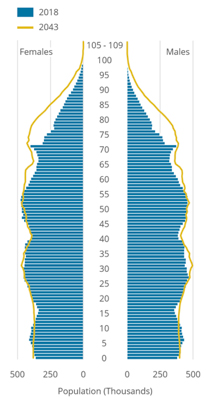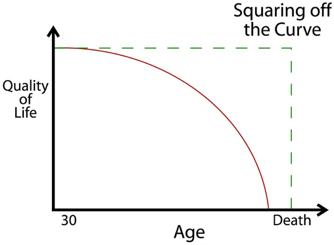People are living longer. That’s good news, right?
By 2030 the number of people in the UK aged 60+ is estimated to increase to 20 million, up 31% from the current total of 15.3m today (Reimaging Ageing 2018, UKActive). By mid-2031 the UK population is expected to reach 70 million and the over 60s will account for 28% of the UK population.
In fact, by mid-2043, there are projected to be many more people at older ages. This partly reflects the 1960s baby boomers now being aged around 80 years but also general increases in life expectancy. In mid-2018, there were 1.6 million people aged 85 years and over; by mid-2043, this is projected to nearly double to 3.0 million.
 The ONS calculates that there are currently 3.5 people of working age per pensioner, but this will reduce to 2.7 by 2041. This lower tax yield plus an increase in life expectancy means a prolonged and increased demand on social care and health budgets – particularly for local government. According to the IFS, transfer payments from the NHS to local-authority-organised adult social care (through the Better Care Fund) was approx. £1.9 billion, 11% of what local authorities spent.
The ONS calculates that there are currently 3.5 people of working age per pensioner, but this will reduce to 2.7 by 2041. This lower tax yield plus an increase in life expectancy means a prolonged and increased demand on social care and health budgets – particularly for local government. According to the IFS, transfer payments from the NHS to local-authority-organised adult social care (through the Better Care Fund) was approx. £1.9 billion, 11% of what local authorities spent.
The IFS says: “the population is ageing, which will have put additional pressure on adult social care services. Between 2009 and 2016, the number of people in England aged 65 and over is estimated to have grown by 18% (or 1.5 million people). Over the same period, the number of adults aged 85 and over has increased by 17% (or just under 200,000 people).” Click here to read the full article.
Local government relies on funding from council tax and business rates… but councils face a massive challenge as a result of the pandemic – how to stimulate local economic growth and maintain income.
What happens to councils where social care and health needs grow faster than revenues? How will local government provide the growing social care services it is required to provide?
It could reduce demand… but how?
The issue is not that there IS an ageing population – it is what the ageing population is DOING. If the ageing population is active and healthy the situation improves and demand for social care is dramatically lower – and often reduced to a much shorter end of life period of months rather than a drawn-out period of years or even decades. In other words, an increased ‘healthy life expectancy’.

After a long career, retirement is supposed to be a positive experience, a time to enjoy hobbies and leisure activities, to travel and spend time with friends and family. The sad reality is that, for many, retirement means a loss of health, freedom, loneliness and even isolation after the death of a partner, accompanied by avoidable long-term physical and mental health conditions.
The price of loneliness: social exclusion from active ageing
Four in 10 GPs say they regularly see patients who are lonely rather than in need of medical help. The majority of the 769 GPs taking part in a 2019 survey – 61% – also agreed that ‘loneliness is a much bigger problem in today’s society than 10 years ago’. View that survey here.
But what if there was a solution that added to the local economy, one that reduced the need for expensive ongoing social care budgets AND which also reduced the pressure on local GP services?
Funding solution: active ageing + longevity economy
What is active ageing?
According to the World Health Organisation’s view on active ageing: “The word “active” refers to continuing participation in social, economic, cultural, spiritual and civic affairs, not just the ability to be physically active or to participate in the labour force.”
Healthy ageing means enabling older people to enjoy a good quality of life and healthy ageing strategies should create the conditions and opportunities for older people to have regular physical activity, healthy diets, social relations, participation in meaningful activities and financial security. Local government plays an important role in this.
From a healthcare perspective active ageing helps to promote healthy living and to extend life expectancy and quality of life for all people as they age.
People living longer is a thing to celebrate. Active ageing means turning a potential challenge into a positive reality: the potential provided by the longevity economy, stimulated by enabling older people to live active and healthy later years, is something that local and national government and the business community should welcome.
This is certainly true for the leisure sector as we ‘Recover and Reinvent’. The leisure sector is part of the reason for the good news that people are living longer, and central to that is the role in helping people to remain socially and economically active. The ‘mother of all untapped markets’ is here and growing for those who reimagine and future-proof what they do.
Active Ageing should become a greater priority as we build back stronger from the current pandemic: helping to ensure a healthier life for our older communities and build resilience to future health and economic shocks. The leisure sector has a role in nurturing a ‘healthy life expectancy’, whilst reaping the business benefits of the longevity economy.